Last Updated: June 15, 2022
With the Covid-19 pandemic, travel as we know it has certainly changed. But what is traveling to Costa Rica like right now? With some key changes and extra precautions, we think that visitors can still experience what makes this country special. Beautiful beaches, verdant green mountains, diverse wildlife, and warmhearted locals. In this post, we’ll share what you need to know when traveling to Costa Rica during Covid-19. We’ll cover entry requirements, and let you know what to expect at hotels, restaurants, and on tours.

IMPORTANT UPDATES
No More Health Pass, Insurance Requirement, QR Code, or Mask Mandate.
On February 23, the government eliminated the Covid entry requirements and made some other key changes. Specifically, as of April 1, 2022:
1. The health pass is no longer required for entry.
2. A negative Covid test is not required for entry.
3. Travel insurance will not be required for unvaccinated visitors.
4. QR Code Program – Businesses will not be required to ask customers for proof of vaccination to enter and can all operate at full capacity. Previously, nonessential businesses had to operate at 50% capacity if they didn’t require vaccination. The government has abandoned this plan. For more information on the QR code program, read our post, Costa Rica’s Vaccine Passport.
In addition, as of May 11, 2022, masks are no longer required in Costa Rica for the general population. Here is the link to the applicable law (in Spanish).
Current Entry Requirements
Regular entry requirements are in effect. These can be found on the Costa Rica Tourism Board website.
To enter, you need to show:
1. A valid passport.
2. Proof of leaving the country, usually within 90 days (e.g., plane ticket).
3. Visitors from certain countries will need a visa.
More Covid Travel Information
Testing Positive
For information on Costa Rica’s quarantine period and how it works when you test positive, read our post, Testing Positive for Covid in Costa Rica.
Covid Test for Return Home
If you need to get a Covid test in Costa Rica before you go back home, check out our post, Where to Get a Covid-19 Test in Costa Rica. This has a detailed list of where to get a PCR or antigen (rapid) test by town.
At-Home Covid Testing
Read our article for some essential info about using a self-test to reenter your home country.
Old Costa Rica Entry Requirements for Tourists
Below are the previous entry requirements that were in effect through March 31, 2022. THESE ARE NO LONGER REQUIRED, but we are keeping the information in this article so that you are aware of the past requirements.
To enter Costa Rica, visitors will need to do the following. For the requirements for Costa Rican citizens and residents, see the section below.
IMPORTANT: Costa Rica no longer requires a negative Covid test to enter. This requirement was eliminated in 2020.
1) Complete an Online Epidemiological Form (Health Pass). *Only required up until March 30, 2022.
The form can only be filled out within 72 hours of your flight, not sooner.
This short form called the Health Pass (found here) asks for personal information like your name, age, nationality, passport number, and flight details. You will also need to provide your hotel/accommodations in Costa Rica.
If you need to show Covid travel insurance because you are not vaccinated, you will need to indicate if you are using one of the Costa Rican companies or an international provider. If an international provider, you also will need to upload your policy certificate to show it meets Costa Rica’s requirements.
If you are fully vaccinated and not getting Covid travel insurance, you will upload your vaccination card or certificate.
Note: If you are vaccinated and the Health Pass is still asking for proof of insurance, select International Insurance and upload your vaccination card. A reader asked the Costa Rica Tourism Board about this glitch and this is what they suggested.
The Health Pass ends with making you agree to declarations. One is that you do not have symptoms of Covid-19 now and that you will comply with a quarantine order if you get Covid-19 during your visit.
A QR code then will be generated, which you can show on your mobile phone.
English Language Option: The Health Pass defaults to Spanish, but there is an option at the top right to change to English.
Tip: The form only works 72 hours or less before your flight. You can’t fill it out sooner than that. If you are within the 72 hours, the problem may be your web browser. Some people have reported problems when using Chrome. Microsoft Edge seems to work without any glitches.
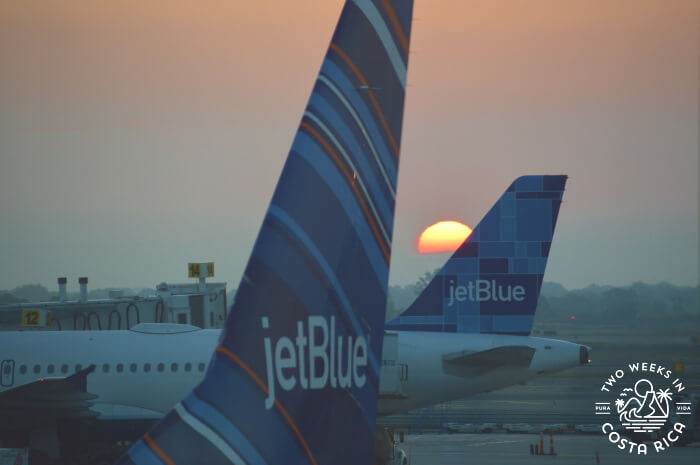
2) Get a Travel Insurance Policy if You Are Not Fully Vaccinated or a Minor. *Only required up until March 30, 2022.
Overview
Unvaccinated visitors (adults 18 and over) must purchase travel insurance for the duration of their stay to cover their expenses in case they get Covid-19. The insurance must cover medical expenses and accommodation expenses for 14 days of quarantine. Specific coverage amounts are provided below.
FULLY VACCINATED TRAVELERS AND MINORS: On July 9, 2021, the Costa Rican government announced that fully vaccinated travelers and all minors (under 18) do not need to show Covid travel insurance as of August 1. The specific requirements are detailed below in Section 3.
You have two options for the insurance. One is to purchase it directly through a provider in Costa Rica. These have been preapproved by the Costa Rican government to offer Covid-19 insurance, so these policies will be automatically accepted.
Alternatively, you can buy insurance that meets the requirements through an international insurer of your choice. Then you will need to go through an additional verification process. See below for more details.
For coverage amounts, $20,000 USD in Covid-19 medical coverage is required if you use a Costa Rican insurance company. If you use an international insurance company instead, the minimum amount is $50,000 USD. Accommodation coverage in case of quarantine is the same no matter which coverage you choose ($2,000 USD).
IMPORTANT NOTE ON LONG-TERM STAYS: Refer to the section below called Long-Term Visits and Visa Lengths for information on how your insurance coverage affects your visa.
Costa Rica Insurance Options
Currently, there are three companies in Costa Rica that are approved to sell Covid insurance, INS (the government insurer), Sagicor (a private company), and Blue Cross Blue Shield Costa Rica (a private company). You can buy the INS insurance through their website directly or using a local broker for no additional cost. You can buy a policy from Sagicor or BCBS directly through their websites.
Sagicor’s rate is a flat daily rate, which usually makes it less expensive for shorter trips than INS.
The INS rate is more variable based on your age, trip length, etc. We have heard from people that it is usually cheaper for longer visits than Sagicor.
Blue Cross Blue Shield bases the cost on your trip length only. Here is a link to a chart with pricing.
International Insurance Options
Overview
International insurance policies are also acceptable, provided they meet the minimum requirements. Specifically, the insurance must cover at least $50,000 USD for medical expenses associated with Covid-19 and $2,000 USD in accommodation expenses to cover at least 14 days of quarantine. You can find these requirements on the Tourism Institute (ICT)’s website.
International Insurance Options
We have been hearing from readers about international insurance options that they have used to enter Costa Rica. ICT has approved the policies when submitted for approval. So they seem to meet Costa Rica’s requirements, including the $2,000 for accommodation coverage in case of quarantine.
Here is a list of international insurance options.
Trawick International is the most popular because of their affordable rates. Many people have told us their policy was easily accepted when entering Costa Rica. Trawick offers the Safe Travels Voyager plan for US residents. The mandatory $2,000 accommodation coverage is included under Trip Delay.
Trawick also has two plans for travelers from other countries (outside the US). These plans meet Costa Rica’s requirements as well. They are the Safe Travels International plan and Safe Travels International Cost Saver plan.
Other international insurance companies that travelers have used include Insubuy, Travel Guard Preferred, and Seven Corners. Seven Corners offers coverage for residents of almost every country, with some exclusions.
*Note: If you purchase a Trawick insurance policy through the links above, we earn a small commission at no additional cost to you. This helps support our site and allows us to keep this information up to date. Thank you!
Canada Residents: For Canadian residents, we have heard of people entering with TuGo and Blue Cross Blue Shield. For BCBS, they request a confirmation letter from them saying that it covers Covid and the $2,000 USD accommodation expense.
Another option we recently heard has worked for Canadian residents is Manulife. See comment from Bari on December 30. We have also heard that it worked for a couple of other people in December.
If you know of another insurance option, please let us know in the comments below.
IMPORTANT: Keep in mind that these insurance companies/policies have not been preapproved by the Costa Rican government. So you will still need to upload them for approval as part of the Health Pass.
We also cannot vouch for the companies in general, as we have not used them before ourselves. So you will need to do your own due diligence to make sure that the specific policy you’re buying meets the requirements and you are comfortable. Make sure they cover $50,000 in medical expenses for Covid-19 and $2,000 in accommodations due to quarantine.
If you’re using international insurance other than the widely used options above, we highly recommend emailing ICT/the Tourism Board with your policy information in advance so that you don’t have any problems. Print the email response from ICT and bring a hard copy in case you need to show it at the airport.
ICT’s email is seguros@ict.go.cr
Verifying Your International Policy
The country’s Tourism Institute is in charge of verifying that international policies comply with the requirements. The process is now digital. You will give your insurance information as part of the online Health Pass (see above).
You will upload to the Health Pass an insurance certificate (issued in English or Spanish) stating the following. It would still be a good idea to bring this document with you.
- The validity of the effective policy during your visit to Costa Rica.
- That it guarantees coverage for medical expenses associated with the pandemic disease COVID-19 in Costa Rica, for at least $50,000 (US dollars).
- That it includes a minimum coverage of $2,000 for extended lodging expenses due to pandemic illness.
After you complete the Health Pass, it will automatically generate a QR code that you can show Immigration when you check in for your flight.
HAVE MORE INSURANCE QUESTIONS?
If you still have questions about insurance, refer to our separate post, Costa Rica’s Required Travel Insurance. This provides more detail and covers 15 frequently asked questions.
3) Show Proof of Vaccination if Fully Vaccinated. *Only required up until March 30, 2022.
If you are fully vaccinated, you do not need to show Covid travel insurance to enter Costa Rica, provided you meet certain requirements.
You need to show proof of full vaccination (two doses, or one dose for Johnson & Johnson) through a record or vaccination card. The approved vaccines in Costa Rica are Pfizer-BioNTech, Moderna, Astra-Zeneca, Johnson and Johnson, Sinovac-CoronaVac, Sinopharm, or Covaxin.
The document/vaccination card must include:
- Your full name
- Date you received each dose. *The last dose must have been administered at least 14 days prior to travel.
- Formula (Pfizer-BioNTech, Moderna, Astra-Zeneca, Johnson and Johnson, Sinovac-CoronaVac, Sinopharm, or Covaxin)
You will still need to fill out the online health pass.
You will upload your vaccination card or vaccination certificate to the health pass in advance. You will not need to show a hard copy.
Minors: All children under 18 do not need to show Covid travel insurance to enter Costa Rica.
4) Abide by the Regulations Put in Place by Costa Rica’s Ministry of Health During Your Visit
You must abide by all government regulations regarding Covid-19 during your visit. We cover below the requirements at the airport and throughout your trip.
Long-Term Visits and Visa Lengths
If you are planning a long-term visit to Costa Rica and are not vaccinated, you should know about an important government circular.
On November 1, 2020, Immigration announced that the number of days granted to tourists upon entry would depend on the travel insurance purchased. So, for example, if someone purchased 14 days’ worth of insurance, they would be granted a 14-day visa stamp.
Normally, the standard visa duration in Costa Rica is 90 days. (The exact number of days is up to the discretion of the immigration official, but 90 days is standard.) However, because tourists were purchasing insurance to cover only a small part of their stay (e.g., insurance for 7 days with the intention to remain in the country for several months), Immigration issued this rule.
So be sure to purchase insurance for the full duration of your stay. If you want to stay for 90 days, purchase 90 days’ worth of insurance and make sure your plane ticket out of Costa Rica matches and is for the same date.
Monthly and Annual Rental Car Discount: If you are planning a longer stay in Costa Rica, be sure to check out our monthly and annual car rental page. The rates are much lower than just renting by the day or week. This is through Adobe Rent a Car, who we have been recommending for years.
Showing Your QR Code and Documentation to Airport Officials
We have been closely following how it has been going for people entering Costa Rica during this time. The process seems to have become fairly streamlined and straightforward. As long as you have the right insurance and have a QR code, you shouldn’t have any problems.
At the airport during check in, the airlines usually want to see only your QR code and not the actual paper insurance documents. Still, if you’re using international insurance, it’s not a bad idea to bring a hard copy of the insurance certificate showing the necessary coverage, just in case.
When you arrive in Costa Rica, officials will check your QR code and only need to review your documentation if needed based on what you submitted online through the Health Pass. We have heard from many people that getting through customs and immigration at the airport has been very fast.
Costa Rica Entry Requirements for Citizens and Residents, and Tourists with a Direct Relationship
Below are the entry requirements for (1) Costa Rican citizens; (2) residents of Costa Rica; and (3) people with residency applications in process.
Citizens and residents are no longer required to quarantine for 14 days after entering Costa Rica.
Costa Rican Citizens and Residents
Residents
Permanent residents and temporary residents with legal status (cedulas) will need to present their passport, cedula/DIMEX card (or approval resolution if they haven’t received their DIMEX yet), and complete the Health Pass.
In addition, they will need to either (1) prove that their Caja payment is up to date; or (2) if their Caja is not current, purchase insurance with a minimum coverage of 22 days. During those 22 days, the resident is expected to settle up their Caja to ensure they are paid in full. Previously, residents could enter only with proof of their Caja being paid; however, after a few people were denied entry recently, the government modified this requirement.
For additional details on the requirements for residents, visit this website.
People with Residency Applications in Process
Those who have filed their residency application but have not yet been approved are considered tourists for purposes of entering Costa Rica.
Citizens
Nationals only need to complete the Health Pass to enter.
What is Open for Tourists?
Overview
Costa Rica has been working hard to reopen its economy for tourism. As of April 2022, most of the tourism industry is back open again.
Costa Rica had a very strong high season in 2021/2022. High season starts in December and ends in April.
As of April 15, 2022, 85% of the population has had at least one shot. 78% are fully vaccinated (two doses).
For information on Costa Rica’s current Covid numbers, read our separate post Costa Rica and the Coronavirus.
Businesses, Tours, and Attractions
Update: As of March 7, 2022, there are no restrictions to business hours.
Restriction Until March 7:
Businesses with a health permit (stores, restaurants, bars, etc.) can operate from 5:00 a.m. to 12:00 a.m. This is consistent with the driving curfew, which is also now from 5:00 a.m. to midnight.
Restaurants, bars, supermarkets, shops, etc. are open at 50% capacity. On December 1, this increased to 100% capacity for those businesses requiring proof of vaccination.
Hotels are open at full capacity, but common areas like pools and hotel restaurants need to be at 50% capacity.
Casinos at hotels are open at 75%, subject to certain limitations.
Beaches are open from 5:00 a.m. to 11:00 p.m. every day.
National parks can operate at 100%.
This government website has more specific information on what is open (in Spanish).
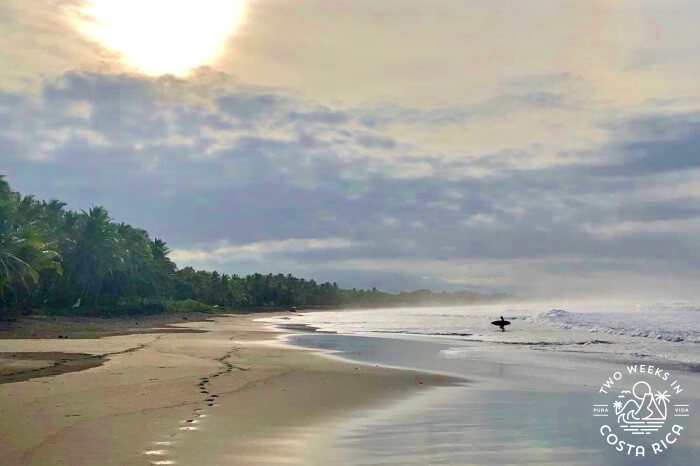
Driving Restrictions/Curfew
Costa Rica has driving restrictions that limit travel based on license plate number. [Note: These ended on March 7, 2022.] Since rental cars are exempt, most tourists will not be affected by this. If you are pulled over by transit police during your stay, you will just need to show them your rental car contract.
Keep in mind, though, that there are nighttime curfews. Countrywide, driving is currently permitted from 5:00 a.m. to 12 a.m. Rental cars are still exempt from these requirements, but if you want to avoid getting pulled over, we’d recommend avoiding driving during the curfews.
Safety and Sanitary Measures That Travelers Need to Follow in Costa Rica
Since tourism is a huge part of the local economy in Costa Rica, the government is ready to welcome visitors once again. They have emphasized, however, that visitors need to follow all sanitary requirements to slow the spread of Covid-19. Costa Rica has a socialized health care system and a limited number of hospital beds that are filling up quickly. Making sure that the hospitals do not become overwhelmed is essential to further reopening tourism, and keeping both visitors and local residents safe.
Below are the main protocols that visitors to Costa Rica will need to abide by.
Follow Airport Protocols
Upon landing on Costa Rican soil, travelers must wear face protection (cloth mask that covers the nose and mouth) and comply with all airport protocols. This includes following the physical distance requirements, allowing for their temperatures to be taken, hand sanitizing at designated stations, and following any other sanitary measures.
Stay in Your Social Bubble
Costa Rica uses the social bubble philosophy for social distancing. People are encouraged to stay within their personal social bubble. Your social bubble is the people who you live with, most commonly, your family. For travelers, this will be easy. Your social bubble will be whoever you are traveling with.
You’ll notice when you get here that some common areas will be partitioned off or marked for social bubbling. At a few of the more popular beaches, they have put up bamboo markers to space people 1.8 meters (6 feet) apart. At other public spaces, similar measures have been put in place.
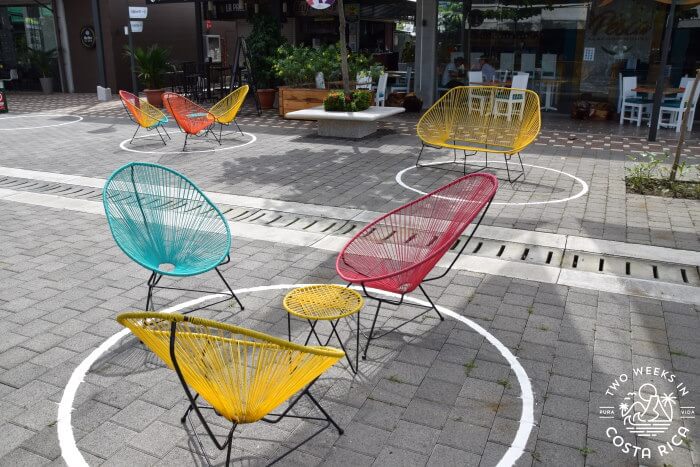
Wear a Mask
Masks covering the nose and mouth are required in most indoor spaces in Costa Rica. One is needed at grocery stores, all other stores and shops, banks, on buses and at bus stops, and in taxis. Some tours and attractions may require masks as well, so it’s always a good idea to carry one with you.
Masks are not required for customers at restaurants. However, the staff needs to wear them.
The government has stated that if you do not wear a mask, you may be denied entry. Businesses can temporarily lose their operating permit if customers are found in violation, so most establishments take the rules very seriously.
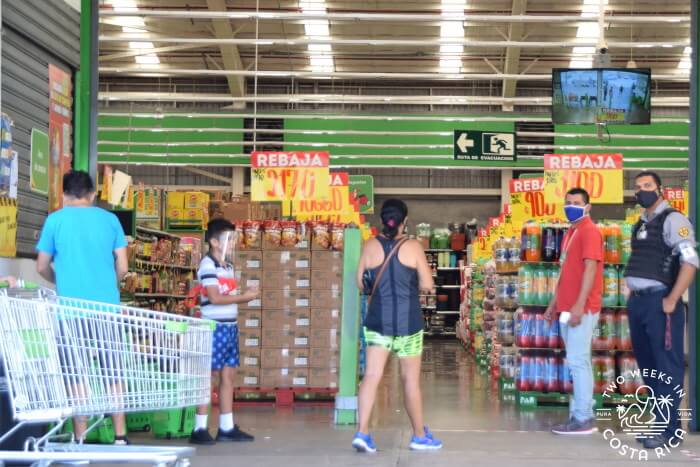
Preventative Measures to Protect Travelers (and Locals)
Overview
Sanitary Protocols
The Ministry of Health and President’s Office have established various sanitary guidelines that all tourism businesses must follow to protect both travelers and workers. Costa Rica’s tourism institute, the Instituto de Costarricense de Turismo (ICT), has specific guidelines that implement these protocols.
We have combed through these guidelines at length. They are extremely detailed and cover many different situations. They address the measures that tour guides and the staff at restaurants, hotels, rental car companies, etc. need to follow. They are aimed at providing training for the people who you will be interacting with during your trip.
Below are some notable measures that tourism businesses need to follow. They include measures on cleaning, sanitation, social distancing, personal protective equipment, food preparation, and lots more. This list is by no means exhaustive. We just included some of the more essential and interesting points.
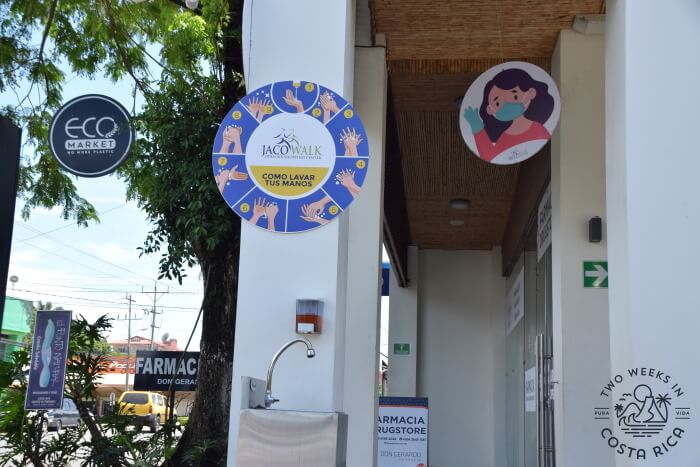
Safe Travels Stamp
In addition, it is worth noting that Costa Rica has received the Safe Travels stamp from the World Travel and Tourism Council. It has implemented 16 global health and hygiene protocols to promote safety in tourism.
Airport
Health and Safety Protocols
Preventative measures at SJO Airport include signage with physical distance guidance throughout the airport, sanitizing carpets, handwashing and sanitizing stations, temperature checks, continuous cleaning and disinfection, and luggage arrangement service at baggage claim.
For departing flights, a guard will screen at the entrance to make sure only passengers will be allowed in the terminal. Ticketing agents will be behind glass barriers. There will be social distancing in seating areas, and boarding passes will be self-scanned.
Airport Health Accreditation
In October, San Jose Airport received the Airport Health Accreditation from the International Council of Airports. This recognizes that SJO Airport has safe facilities and that appropriate precautions are being taken to reduce health risks. SJO Airport is currently one of 58 airports around the world with this designation.
Hotels
Hotels have many measures in place, including the following.
At check in, the receptionist should wear a mask and maintain social distance with fellow employees and guests. The reception area should be cleaned at least every 30 minutes.
Marks should be put on the floor to ensure guests are at least 1.8 meters apart.
Guests should handwash/sanitize before check in.
The phone numbers of hospitals and medical centers should be posted in the reception area.
Pre-check-in should be used whenever possible to limit time at the reception desk.
UV technology should be used to disinfect room keys.
Bellhops should disinfect the guest’s luggage as well as the baggage cart afterwards.
Cleaning staff needs to wear personal protective equipment (a uniform, mask, and gloves). They follow strict cleaning, disinfecting, and sanitizing procedures using approved chemicals. They should clean all bedding without shaking it and deep clean high-touch items like remote controls, doorknobs, light switches, lamps, coffee makers, etc. They need to keep a cleaning record.
Whether a room should be cleaned daily should be decided by the guest.
Guests should be informed of the sanitary practices being carried out at the time a reservation is made and on the hotel website.
Restaurants
At restaurants, employees must wear a mask and follow handwashing and cough and sneeze protocols. The restaurant must maintain and refill soap and hand sanitizing stations (automatic if possible) and in the bathroom. They must constantly clean and disinfect, with records to keep track.
Restaurants can be at 50% occupancy (or 100% capacity if they require proof of vaccination). Tables should be rearranged so that the backs of chairs are at least 1.8 meters apart.
Digital menus should be used when possible.
Markings should be added to the floor to maintain social distancing at waiting areas (bathrooms, cashier areas, etc.).
Food at buffets and salad bars should be handled by workers only.
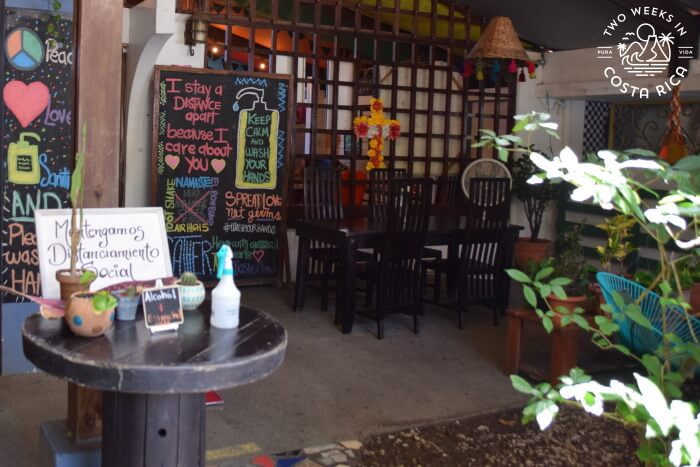
Tours
Tours can operate at 50% capacity within social bubbles (or 100% capacity if they require proof of vaccination).
Tour guides must inform clients of the sanitary protocols and rules that they will be following during the activity.
Tour guides must have personal protective equipment, including masks. They must maintain distance between themselves and clients and have hand sanitizer available. They need to regularly disinfect frequently touched items like binoculars, scopes, lifejackets, flashlights, etc.
Social distancing between people of different social bubbles must be maintained. There should be at least 15 meters (50 feet) between different groups.
For hiking activities, they will limit groups to no more than 6 people. Groups should be people from the same social bubble. *You will see that many tour operators are offering only private tours for this reason.
Handwashing is required before entering a tourist site and when leaving.
Electronic payment is encouraged.
If a tour guide suspects a Covid-19 case, they will communicate this with the Ministry of Health using the official methods.
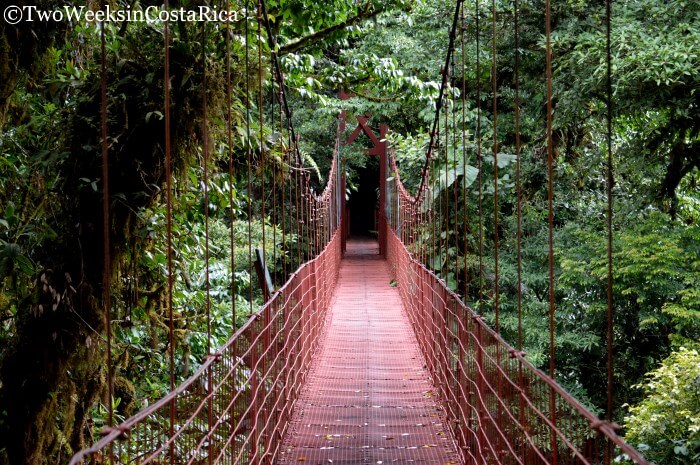
Rental Cars and Shuttles
Shuttles
Shuttle van companies need to clean and disinfect all vehicles before and after use. They need to give special attention to high-touch areas like handles, railings, seatbelts, seats, dashboards, and mirrors. They should keep daily cleaning records and wear personal protective equipment.
Drivers and personnel should wear a mask or face shield. They need to ensure that passengers comply with the mask requirement and not allow anyone in the van who appears sick.
They need to provide visitors with hand sanitizer before they enter the vehicle and disinfect their bags. Cleaning products and hand sanitizer should be available in the vehicle at all times.
Companies must display the sanitary protocols of the Ministry of Health in vehicles. They will provide information to passengers about ways to minimize health risk.
Rental Cars
Rental car companies must follow similar requirements.
They need to intensify cleaning and hygiene measures in their offices, focusing on surfaces where there is greater contact (e.g., handles, reception furniture, doorknobs, computers, railings).
Cars must be cleaned and disinfected before and after each rental using approved products. They should keep daily cleaning records. Employees must wear personal protective equipment.
Masks and gloves must be provided to employees who work with customers directly.
Hand sanitizer should be available to customers.
Companies should mark the floor to maintain social distance among customers who are waiting.
The temperature of both customers and employees should be taken upon entering a rental car office.
For car pickups and deliveries not at the company’s office (e.g., at hotels or vacation rentals), the employee must inform the customer in advance of the preventative and cleaning measures being taken. The employee will use preventative measures when interacting with the customer to maintain social distance. Examples include asking the customer to put the keys on the hood rather than exchanging them directly for returns and disinfecting high-touch areas like the steering wheel, gear lever, and door handle when dropping off a car for a customer.
Companies should email vehicle inspection reports to customers.
They should implement electronic payment methods or contactless credit/debit cards when possible.
Where to Get a Covid-19 Test in Costa Rica
If you need a Covid-19 test at the end of your trip for purposes of onward travel, there are several convenient options. Read our separate post, Where to Get a Covid-19 Test in Costa Rica, for recommended hospitals and labs and what to expect.
Last Updated: May 17, 2022
Have a question about traveling to Costa Rica during Covid-19? Leave us a comment below.
Looking for more information? Check out these posts:
Costa Rica and the Coronavirus: We are updating this post almost every day with the latest data and restrictions in place.
Living in Costa Rica During Covid-19: Our more personal account on what it has been like to live in Costa Rica during this time.
Destinations Summary Guide: If you’re at the beginning of your planning, this guide can give you a head start. It summarizes every destination we cover on our website to help you narrow your itinerary.
Rental Car Discount: If you plan to rent a car during your upcoming trip, check out this discount to save 10-20% with one of the most reliable companies in Costa Rica. Safety protocols are a top priority.72
